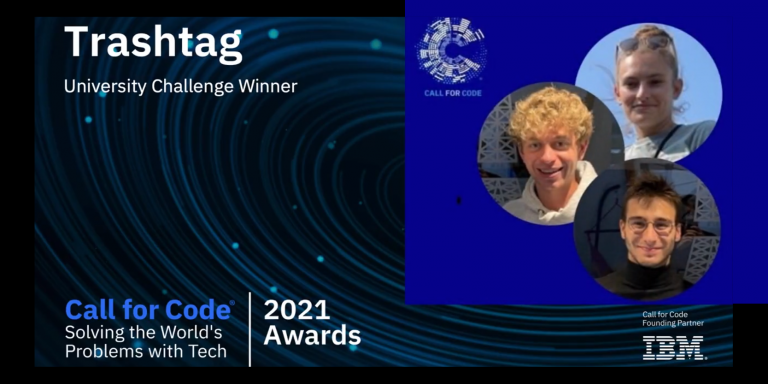
David Clark Cause, founded by philanthropist David Clark, is behind Call for Code, the largest developer engagement to date. Call for Code Global was launched in Paris at the Viva Tech 2018 conference with the support of Emmanuel Macron and IBM President Ginny Rometty. For this 2021 edition, developers were asked to submit projects to fight the effects of climate change and it was Trashtag, the French team from ISEP that won the University Challenge of this call.
This Challenge was created in partnership with the Office of the United Nations High Commissioner for Human Rights, the Linux Foundation and IBM. The Challenge invites developers, start-ups, academics and NGOs from around the world to create and contribute to innovative open-source technology projects that solve major global societal challenges. This year, solutions based on artificial intelligence, cloud computing, IoT…tackled three of the 17 UN Sustainable Development Goals:
- Clean water and sanitation
- zero hunger
- responsible production and green consumption.
Projects must have a real ecological impact but a very small footprint.
30 million dollars from IBM, a sustainable development player
Since the 1990s, IBM has decided to limit the ecological impact of its businesses and has undertaken research and development work with this objective. The company supported the Paris Agreement in 2015 and recently joined the Climate Leadership Council. In 2020, IBM launched “Future of Climate”, an initiative that brings together global researchers specializing in the development of innovations such as sustainable hybrid clouds, AI platforms dedicated to the climate or accelerating decarbonization. It was therefore an obvious choice for IBM to join Call for Code for a sustainable environment and to provide financial support of 30 million dollars.
Trashtag, the French team that won the University Challenge
Maë Bain, Erwann David and Adrian Kinsey-Hillou, students in the digital engineering cycle at ISEP, are the winners of this challenge with a project designed around blockchain and artificial intelligence. The objective of this one is to “fight against unregulated pollution while developing the financial resources of the most fragile populations”
The project
One of the major challenges of our society is the depollution of the oceans and natural environments invaded by almost 10 million tons of waste every year. The “Trashtag Warriors” have designed a “decentralized employment model that creates an economic interest for positive action”. Photos of polluted areas are sent to the platform, then photos of the same areas cleaned. The AI then validates the cleanup and those who have done it receive a reward in the form of a jobcoin that they can then exchange with an officially recognized currency.
In an interview, Maë Bain said:
“There is a lot of littering going on around the world. At best it disfigures the landscape, at worst it can be dangerous for people and the environment. In some countries, water pollution from plastic waste causes diseases such as cholera, dysentery… And some of the most polluted areas of the world are those where there is the most poverty. So the idea was to connect these two issues via crypto-finance. Our ambition is to create an economic virtuous circle by remunerating the collection of abandoned waste.”
Adrian Kinsey-Hillou added:
“Concretely, if a user identifies a place contaminated by wild pollution, they can take a picture of the waste, roll up their sleeves to pick it all up and then take a picture back to show the work done. These photos are then sent to our verification engine. If the action is validated, the user is rewarded with a cryptocurrency amount. This amount is determined by artificial intelligence and depends on the amount of litter collected. Our cryptocurrency is then exchangeable with other cryptocurrencies, and by extension, with currencies with an official exchange rate.”
Erwann David concludes:
“With our app, a large number of people, especially in developing countries, will be able to support themselves with the money freed up to protect the environment. Trashtag lays the foundations for a new form of employment, 100% digital, accessible to all, decentralized, meeting the objectives of sustainable development set by the UN.
Future of the project
About the future of this project, Adrian Kinsley-Hillou states:
“We went to COP26 to present Trashtag and demonstrate how the technology could provide concrete solutions for environmental protection. We had a very positive reception from a large number of political actors, entrepreneurs, associations and “green” investment funds. Addressing the dual challenge of pollution and access to an income is a strong point of our project. All you need is a smartphone to use our application and it is important to know that smartphones connected to the Internet are very widespread in developing countries. In 2020, for example, 45% of the population of sub-Saharan Africa had a smartphone and this figure is expected to grow significantly in the coming years. We are going to submit an application to join the ISEP incubator. The idea is to challenge our ideas, to adjust the concept to go beyond the project we presented at Call for Code.”
Translated from TRASHTAG, équipe française de l’ISEP, remporte le Défi Universitaire du Call for Code 2021









